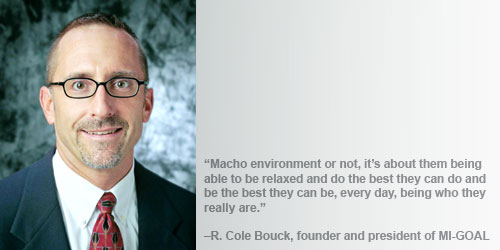By Tara Cavanaugh

Back in the early 1990s, when R. Cole Bouck was working in the Michigan Department of Corrections, he found himself suddenly forced out of the closet.
For a couple of months, it made his life hell.
"I wasn't hiding, I hadn't necessarily led a secret life, but it wasn't something that was out there," he says. He survived the harassment, but "after that, I made a commitment to myself to do what I could to make sure that nobody else would go through that."
Bouck is the founder and president of MI-GOAL, the Michigan Gay Officers Action League. Just over a year old, its 13 members are working to make LGBTs more accepted in the traditional, macho culture of the public safety professions.
A top-down approach
"The attitudes filter down from the top in law enforcement, says Erin Linn, an officer in Meridian Township and MI-GOAL's treasurer. "It's a paramilitary organization. We have a chain of command."
Bouck, who now works as an administrative assistant in MDOC's central office, has spent the past year talking about MI-GOAL to any leader who will listen: "Chiefs, directors, state police – you name it," he says.
When he calls to set up meetings with those leaders, he's been met with a variety of reactions. Some are enthusiastic about MI-GOAL, some are hesitant and some don't call him back.
He's taken this approach, instead of just seeking out other public safety workers who may be LGBT, because, well, they're hard to find.
"In our profession, being a very conservative, traditional culture, people are very reluctant to be obvious or to be out, more so than other professions," he says. "So it's hard to know who the (LGBTs) are."
To the hesitant leaders, Bouck tries to explain that public safety professionals, who trust coworkers with their life and safety, shouldn't have to worry that their sexuality will affect how they're supported or treated – especially in dangerous situations. "Macho environment or not, it's about them being able to be relaxed and do the best they can do and be the best they can be, every day, being who they really are," he says.
At the very least, Bouck encourages them to distribute MI-GOAL's pamphlet, either via email or on paper. Many have agreed, which Linn says is a positive development: "So that every single employee in our agency can at least know we exist. Whether that applies to themselves or they can recommend it to a friend or coworker, right now that's our main effort."
Healing the relationship with LGBT citizens
"The LGBT community historically has not had a positive perception of law enforcement, and rightfully so," Linn says.
"I think MI-GOAL can work very hard to change that perception. And build a bridge between the LGBT community and law enforcement to try and repair some damage."
One way MI-GOAL is doing that is by getting police officers to march in the Michigan Pride parade this weekend.
Michelle Bryant, a detective and LGBT liaison for the Lansing Police Department, says she's been asking supportive coworkers to walk alongside the MI-GOAL float. As far as Bryant knows, this is the first year the parade will have police marching in support.
As of press time, she knew of six officers who pledged to walk in the parade, but she hopes for more. "I'm confident that we'll have a good show of support there," she says.
UPDATE: As of Thursday, Bouck confirmed that Lansing Police and the Lansing Fire Department will have vehicles in Saturday's parade for Michigan Pride.
Bouck also wants to partner with other agencies to offer trainings for public safety workers, with the goal of getting the field more comfortable with LGBT coworkers and the LGBT citizens they protect. He says MI-GOAL could create its own trainings, or it could step in and contribute to diversity trainings offered by organizations such as Equality Michigan.
No matter how great a diversity training session may be, ultimately "cops want to hear from cops," Bouck says.
Linn agrees: "Law enforcement is a very closed community. It makes a difference coming from one of their own."
Change takes time
Changing the police culture won't happen overnight, just like creating MI-GOAL didn't happen overnight. The organization, which is a chapter of a national organization called LEGAL, Law Enforcement Gays and Lesbians, was a wish of Bouck's for ten years.
Bouck now calls his unexpected on-the-job outing "the best thing that ever happened to me."
Since his outing, Bouck fought for – and won – the right to attend LEGAL conferences on company time. Initially, his request to attend the LEGAL conferences was denied, although other professional conferences for other minorities were approved. Bouck also slowly gathered support and established MI-GOAL, and now he's slowly and steadily gathering support for MI-GOAL in precincts across the state.
This means that when he says he'll follow up with a police chief who is hesitant about distributing MI-GOAL pamphlets, he means it.
How does he keep up his energy, especially when change seems to happen so slowly?
"I can't afford to give up," he says. "I can't imagine not doing this work. I can't imagine nobody doing it."
Learn more at http://www.mi-goal.com.










